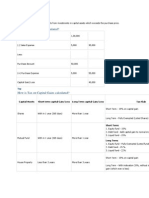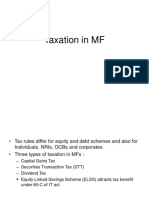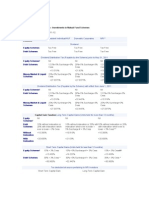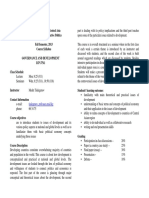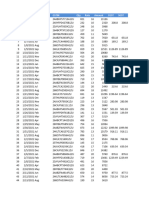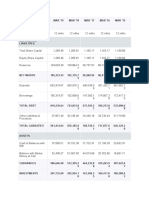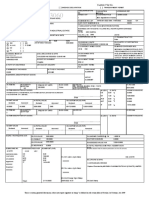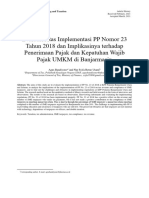Mutual Fund Taxation
1
�Applicability of taxes in respect of MF
•Growth Plan ( Capital Gain/Loss)
•Dividend Plan ( Dividend Income)
2
� Capital Gain
• Capital gain refers to the profit that results from a sale of a
capital assets like stocks, bonds, mutual funds or real estate.
It results in capital gain when the selling price of an asset
exceeds its purchase price.
• The profit (if any) that you make on your mutual fund
investments when you redeem or sell the MF units is referred
to as Capital Gains.
• It can be a Short Term Capital Gain (STCG) or a Long
Term Capital Gain (LTCG) depending upon the ‘Period of
Holding’.
• The tax that is applicable on these profits is known as
‘Capital Gains Tax’.
3
�4
�For Equity Oriented (Equity, Balanced Fund,
ELSS)
• When holding period is less than or equal to 1 year
• STCG (15%)
• When holding period is more than 1 year
• LTCG (10%)
Note: From 1st April 2018 LTCG is applicable
LTCG of Rs 1,00,000 is exempted.
5
� Budget 2018
To tax Long-term capital Gains on sale of Equity
shares/units of Equity oriented Fund if more than Rs
1 lakh at @ 10% without the benefit of indexation.
The grandfathered concept implies that all the gains
on mutual funds/ equity until January 31 will be
exempt from taxation. This only means that the
income tax will not be implied with retrospective
effect, but with prospective effect.
6
�Non Equity Oriented Fund
7
� Indexation
• Indexation means that the cost of acquisition is
adjusted upwards to reflect the impact of inflation.
• The government comes out with an index number
for every financial year to facilitate this calculation.
• Indexation benefit is available only in case of long
term capital gains and not short term capital gains.
• Tax is payable on long-term capital gains on non
equity oriented plan , after indexation, at 20% plus
surcharge plus cess.
8
�Indexation
For example, if the investor bought units of a debt-
oriented mutual fund scheme at Rs 10 and sold them
at Rs 15, after a period of 3 years. Assume the
government’s inflation index number was 400 for the
year in which the units were bought; and 440 for the
year in which the units were sold.
How much tax the investor would need to pay tax
based on indexation?
9
�• ICoA = Original cost of acquisition * (CII of year of
sale/CII of year of purchase)
• Indexed cost of acquisition is Rs 10 X 440 ÷ 400 i.e.
Rs 11.
• The capital gains post indexation is Rs 15 minus Rs
11 i.e. Rs 4 per unit.
• 20% tax on this would mean a tax of Rs 0.80 per
unit.
• Surcharge and education cess is extra.
10
� Dividend
Dividends received on mutual funds are taxed
at the respective income tax slab rate.
Dividends received in excess of Rs.5,000 are
subject to tax deduction at source (TDS) at
10%.
11
� Set Off of Capital Losses
• The Income Tax does not allow Loss under the head
Capital Gains to be set off against any income from
other heads – this can be only set off within the
‘Capital Gains’ head.
• LTCL is set off against LTCG.
• STCL is set off against LTCG or STCG
• STCL or LTCL cannot be set off against any other
sources of Income.
• Can be carry forward up to next 8 assessment years
from the assessment year in which the loss was
incurred
12
� Securities Transaction Tax
• STT is a direct tax levied on every sale of securities that are
listed on the recognized stock exchanges in India.
• STT is governed by Securities Transaction Tax Act (STT
Act).
• Securities transaction tax is a direct tax and is levied and
collected by the central government of India.
• STT is not applicable on purchase of units of an equity
scheme.
• STT is applicable on equity oriented mutual fund not on
debt oriented mutual fund.
13
�STT is imposed on the redemption of mutual funds by you. It
is imposed on transactions directly with an AMC or through a
stock exchange.
14








